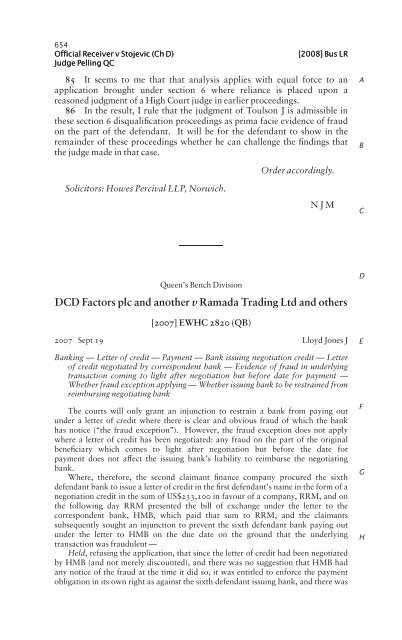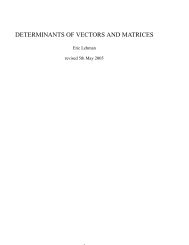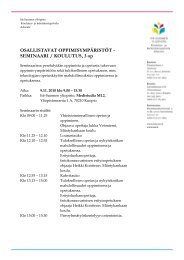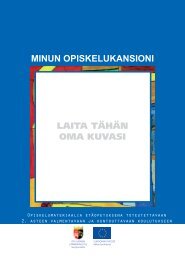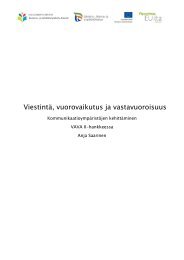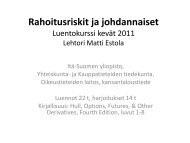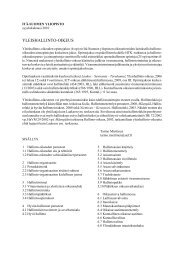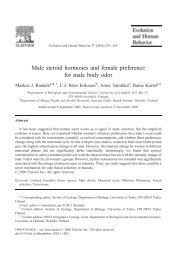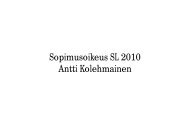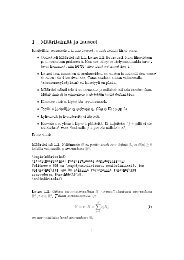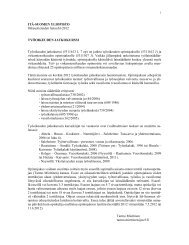DCD Factors Ltd v Habib Bank AG 2008 Fraud exception
DCD Factors Ltd v Habib Bank AG 2008 Fraud exception
DCD Factors Ltd v Habib Bank AG 2008 Fraud exception
- No tags were found...
You also want an ePaper? Increase the reach of your titles
YUMPU automatically turns print PDFs into web optimized ePapers that Google loves.
658<strong>DCD</strong> <strong>Factors</strong> plc v Ramada Trading <strong>Ltd</strong> (QBD)Lloyd Jones J[<strong>2008</strong>] Bus LREdward Owen Engineering <strong>Ltd</strong> v Barclays <strong>Bank</strong> International <strong>Ltd</strong> [1978]1 QB 159. However, there is a well established <strong>exception</strong> to this rule. A bankought not to pay under the credit if it knows the documents are forged or thatthe request for payment is made fraudulently in circumstances where there isno right to payment. In the Edward Owen case, at p 170A—B, the Court ofAppeal approved the observation of Kerr J, that in cases of obvious fraud tothe knowledge of the banks, the courts may prevent banks from fulÞllingtheir obligations to third parties. The rationale is clear. The courts will notallow their process to be used by a dishonest person to carry out a fraud.15 Nevertheless, it is only in <strong>exception</strong>al cases that the court willintervene. The position was summarised in relation to Þrst demand bondsand standby credits by Cresswell J in Kvaerner John Brown <strong>Ltd</strong> v Midland<strong>Bank</strong> plc [1998] CLC 446, 449:ÔÔIt is only in <strong>exception</strong>al cases that the courts will interfere with themachinery of irrevocable obligations assumed by banks . . . Except inclear cases of fraud of which the banks have notice, the courts will leavethe businessmen to sort out their disputes [between themselves] . . . Thusthe courts will refuse to grant an injunction to restrain a bank frompaying . . . save where there is clear and obvious fraud of which the bankhas notice (Ôthe fraud <strong>exception</strong>Õ). Such cases are rare . . . The evidence offraud must be clear; both as to the fact of fraud and as to the bankÕsknowledge. The mere assertion or allegation of fraud is not su–cient forthe purposes of an interlocutory injunction. The court will require strongcorroborative evidence of the allegation . . .ÕÕ16 In the present case, there is evidence which supports the view thatthe claimants have been the victims of a systematic fraud on a substantialscale. In this regard, I would refer in particular to the fax from the lawyersacting for HFK, which is evidence that the letters of credit are fraudulent inthe sense that there are no genuine underlying transactions, and to theevidence of a parallel fraud under the debt purchase agreement. Theevidence there comes from alleged customers of the Þrst defendant, one ofwhom states categorically that no invoices were sent by the Þrst defendantafter June 2006.17 Mr Turner, who appears on behalf of the bank, has not sought topersuade me that there is an absence of evidence of a clear and obvious fraudof which the bank had notice. Rather, his submissions have proceeded onthe basis that the fraud <strong>exception</strong> can have no application in the particularcircumstances of this case. He submits that the letter of credit is anegotiation credit and the undertaking under it is not addressed solely to theultimate beneÞciary but also to any negotiating bank. He submits that theobligation to reimburse arises on negotiation, notwithstanding that paymentunder the letter of credit may not be due until a later date. He submits, in thecase of a negotiation credit, that any fraud on the part of the originalbeneÞciary which comes to light after negotiation but before the due date forpayment does not a›ect the issuing bankÕs liability to reimburse thenegotiating bank. On this basis, he contends that the correspondent bank,<strong>Habib</strong> Metropolitan <strong>Bank</strong>, to which I shall refer as ÔÔMetropolitanÕÕ,negotiated the letter of credit long before any fraud came to light and that,having negotiated for value in good faith, it is entitled to reimbursementfrom the bank. Accordingly, he submits that there is no arguable basis forABCDEFGH
ABCDEFGH[<strong>2008</strong>] Bus LR659<strong>DCD</strong> <strong>Factors</strong> plc v Ramada Trading <strong>Ltd</strong> (QBD)Lloyd Jones Jmaintaining that the bank is not required to make the payment when it fallsdue tomorrow.18 In support of his submission, he refers to two passages in Jack,Malek & Quest on Documentary Credits, 3rd ed (2001), the Þrst atpara 2.22, which distinguishes straight and negotiation credits:ÔÔA straight credit is one under which the undertaking of the issuingbank, or, if it is a conÞrmed credit, the undertakings of the issuing andconÞrming banks, are directed to the named beneÞciary alone, and onlyhe may rely on them. With a negotiation credit the undertakings aredirected to any bank, or to any bank of a description stated in the credit,which becomes a bona Þde holder of any bill of exchange and the otherdocuments which are stipulated by the credit. The purpose of making acredit a negotiation credit is that it enables a bank to negotiate (or buy)the documents from the beneÞciary and then to present them under thecredit and to receive payment in due course. In this way the beneÞciarygets his money immediately from the negotiating bank, and thenegotiating bank has the undertakings given by the credit available to it,and will present the documents under the credit as the party entitled indue course to payment.ÕÕ19 Jack, Malek & Quest also explain, at para 6.17, that where thecorresponding bankÕs instructions cover only the advice of the credit but thecredit is a negotiation credit and it is approached by the beneÞciary tonegotiate and agrees to do so, the bank will purchase the documents fromthe beneÞciary and present them to the issuing bank in its own right. Thecorrespondent bank is dealing with the documents solely as principal in itsown right and it is una›ected by the fraud of the beneÞciary, provided that ithas no notice of it at the time of negotiation.20 On the other hand, Mr Miller, for the claimant, submits what hasoccurred here is not a negotiation of the letter of credit but no more than astraightforward discounting of the letter of credit by Metropolitan. In thesecircumstances, he contends on the basis of the decision of the Court ofAppeal in Banco Santander v Bayfern <strong>Ltd</strong> SA [2000] 1 All ER (Comm) 776that Metropolitan is in the position of an assignee of a chose in action whotakes subject to equities. On this basis, if fraud is revealed on the part of thebeneÞciary prior to the date of due payment, the corresponding bank isunable to enforce the payment obligation because it does not claim in itsown right but through the beneÞciary and is, therefore, a›ected by the fraudof the beneÞciary. That was the result in the Banco Santander case where thecourt was concerned with the deferred payment letter of credit.21 It is clear to my mind that the letter of credit with which we areconcerned is a negotiation credit. Indeed, Mr Miller did not seek to argue tothe contrary. This appears from the terms of the credit. It is expressed to beavailable with or by any bank in Pakistan by negotiation. The specialinstructions are directed to the paying, accepting, negotiating bank and theyinclude the following conditions:ÔÔ(1) Negotiation of documents with any discrepancy under indemnityor otherwise is not acceptable . . .ÕÕÔÔ(3) On receipt of documents and (on due date in case for usancedrafts), conforming to the terms of this credit . . . we undertake to
660<strong>DCD</strong> <strong>Factors</strong> plc v Ramada Trading <strong>Ltd</strong> (QBD)Lloyd Jones J[<strong>2008</strong>] Bus LRreimburse the negotiating bank . . . in accordance with their instructionsat maturity.ÔÔ(4) Negotiating bankÕs discount and/or interest, if any, prior toreimbursement by us are for [account] of beneÞciary.ÕÕ22 It is necessary to consider the history of the letter of credit in order todetermine whether Metropolitan did, in fact, negotiate this letter of credit.The a–davit of Mr Iqbal Kadwani on behalf of the bank sets out the historyof this letter of credit and produces as exhibits the relevant documents.23 By a signed request dated 21 May 2007, <strong>DCD</strong> requested the bank toissue a letter of credit in favour of Royal Rice. In accordance with thatrequest, the bank issued a letter of credit through Metropolitan which is acorrespondent bank and a subsidiary of the bank in Pakistan. That wasdone on 22 May 2007. Royal Rice was advised of the letter of credit byMetropolitan by letter dated 23 May 2007 and it made its presentation ofdocuments to Metropolitan on the same day. The documents included a billof exchange drawn on the bank to the order of Metropolitan. I shall refer tothat as the ÔÔbill of exchangeÕÕ.24 On 24 May 2007, Metropolitan sent the documents to the bank inLondon where they were examined by the department supervised byMr Bashir. Mr BashirÕs department identiÞed two discrepancies in thedocuments. They advised those discrepancies to <strong>DCD</strong> by letter dated31 May 2007 which was sent with a copy set of the documents which hadbeen presented by Royal Rice. The discrepancies were that the letter ofcredit was overdrawn, that is the demand was for more than the maximumamount of the credit, and an inspection certiÞcate was missing.25 By fax dated 7 June 2007, signed by Mr Byatt and another o–cer of<strong>DCD</strong>, Mr Shelley, <strong>DCD</strong> acknowledged receipt of the document, stated thatthey were acceptable, notwithstanding the discrepancies which had beenidentiÞed, authorised the bank to debit <strong>DCD</strong>Õs account on the due date forpayment under the credit, and the fax concluded with this statement: ÔÔPleaseurgently send due date advice to remitting bank and fax to us a copy as soonas possible.ÕÕ26 As a result of <strong>DCD</strong>Õs acceptance of the discrepant documents andpursuant to its instruction, the bank then sent a SWIFT notiÞcation toMetropolitan on the same day in which it advised on the following terms:ÔÔPlease note the following bill has been accepted and falls due for paymentas under, on which date we shall remit proceeds as per your instructions.ÕÕ Inreliance on that SWIFT message, on 8 June Metropolitan credited thediscounted amount of the bill of exchange to Royal RiceÕs account.27 I should refer to one aspect of this history in particular. The pointwas taken by Mr Miller, although I think it is fair to say rather faintly, thatthe bank did not accept the bill of exchange by endorsing it. However, itseems to me that cannot assist the claimants in the particular circumstancesof this case, even if endorsement of the bill itself would normally be arequirement. Given that the bank represented that it had been accepted andthat Metropolitan relied on that in negotiating the letter of credit, it seemsclear that an estoppel would arise.28 However, Mr Miller submits that the court cannot be satisÞed thatwhat occurred was negotiation as opposed to discounting. In this regard, herefers to a request made by <strong>DCD</strong> of the bank on 17 September as to theABCDEFGH
ABCDEFGH[<strong>2008</strong>] Bus LR661<strong>DCD</strong> <strong>Factors</strong> plc v Ramada Trading <strong>Ltd</strong> (QBD)Lloyd Jones Junderlying discounting agreement between Metropolitan and Royal Riceand the basis on which payment is to be made by the bank on 20 September,that is whether it was to be paid under the bill of exchange or under the letterof credit. The reply came in a letter from Metropolitan to the bank dated18 September: ÔÔWe are claiming the amount from you as openers of theletter of credit and acceptors of the draft drawn on you.ÕÕ29 To my mind, the clear e›ect of the transactions is that Metropolitannegotiated the letter of credit; this was the process contemplated by theterms of the letter of credit; the advantages ßowing from negotiation wereclearly understood by those acting on behalf of Metropolitan; and thehistory I have related demonstrates that this is what occurred.30 In his submissions, Mr Miller went so far as to accept that if paymentwas to be made under the bill of exchange then nothing could or should bedone to stop such payment. However, he submitted that the bank had notestablished that payment was to be made under the bill of exchange and thatthe injunction should remain in force until it was established that that wasthe case and Metropolitan produced evidence as to the nature of itsagreement with its customer.31 In response, Mr Turner very fairly accepted that reliance on the billof exchange alone could not get him home. The reason for this is thatMetropolitan is the payee of the bill of exchange and the decision of theHouse of Lords in R E Jones <strong>Ltd</strong> v Waring and Gillow <strong>Ltd</strong> [1926] AC670establishes that the payee cannot become the holder in due course of a bill ofexchange.32 Consequently, he has to rely on the negotiation of the letter of credit.I am entirely persuaded that what occurred in this case was the negotiationof the letter of credit by Metropolitan. Moreover, it seems to me to beartiÞcial to inquire whether payment is sought pursuant to the letter of creditor the bill of exchange. They form di›erent elements of one substantialtransaction. The Metropolitan <strong>Bank</strong> negotiated the letter of credit and ithad the beneÞt of the bill of exchange and the promise under the letter ofcredit.33 As Mr Turner put it in his submissions, acceptance of the bill ofexchange is part of the negotiation of the letter of credit and there is noreason to suppose that anyone at Metropolitan would be able to say whetherit had been paid under the bill of exchange or the letter of credit, and even ifthey did apply their minds to it the answer would probably be both. Thatwas, in fact, the answer which was given.34 For these reasons, it seems to me that this case is on all fours with thesituation addressed by Robert Go› LJ, giving the judgment of the Court ofAppeal, in European Asian <strong>Bank</strong> <strong>AG</strong> v Punjab & Sind <strong>Bank</strong> (No 2) [1983]1 WLR 642, 658, in an obiter passage:ÔÔEven if it were a fact that, as at 13 August, the plainti›s had beenappointed agents for collection by Bentrix, it is beyond question that by20 August the plainti›s had negotiated the letter of credit, and there is nosuggestion that they acted otherwise than in good faith in doing so.Thereafter, in February 1980, they claimed payment from the defendants;and this was refused. In our judgment it is not open to the defendants onthese facts to say against the plainti›s that they were justiÞed in refusingpayment on the ground that the documents were fraudulent or even
662<strong>DCD</strong> <strong>Factors</strong> plc v Ramada Trading <strong>Ltd</strong> (QBD)Lloyd Jones Jforged. In our judgment, the relevant time for considering this question isthe time when payment falls due and is claimed and refused. If, at thattime, the party claiming payment has negotiated the relevant documentsin good faith, the issuing bank cannot excuse his refusal to pay on theground that, at some earlier time, the negotiating bank was a mere agentfor collection on behalf of the seller and alleged against him fraud orforgery (if that indeed be the case) on the part of the beneÞciary of theletter of credit.ÕÕ35 Therefore, I conclude that Metropolitan is clearly entitled to enforcethe payment obligation in its own right. It is not suing on or through therights of the beneÞciary. There is no suggestion here that Metropolitan hadany notice of any fraud when it negotiated the letter of credit. The fact thatfraud came to light prior to the date of due payment does not a›ect thepayment obligation of the bank. There is here no scope for the operation ofthe fraud <strong>exception</strong>. Accordingly, I consider that there is no arguable basison which the issuing bank could refuse to pay. In these circumstances,questions of the balance of convenience do not arise. It is fair to say thismatter was barely touched on in the submissions before me and so I saynothing about them. The submissions before me were limited to thequestion whether it was arguable that this case fell within the fraud<strong>exception</strong>. I have come to the clear view that it is not and that is the basis onwhich I have come to the decision to discharge the injunction against thesixth defendant.Solicitors: Hammonds; DLA Piper.[<strong>2008</strong>] Bus LRApplication dismissed with costs.Injunction discharged.PMMABCDEFGH


